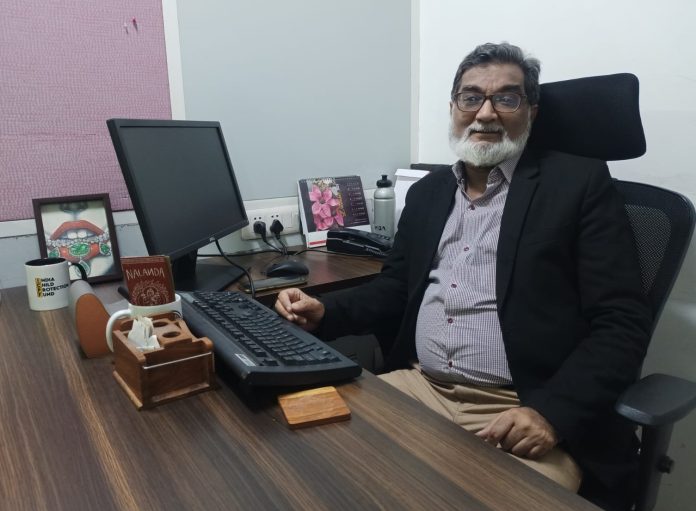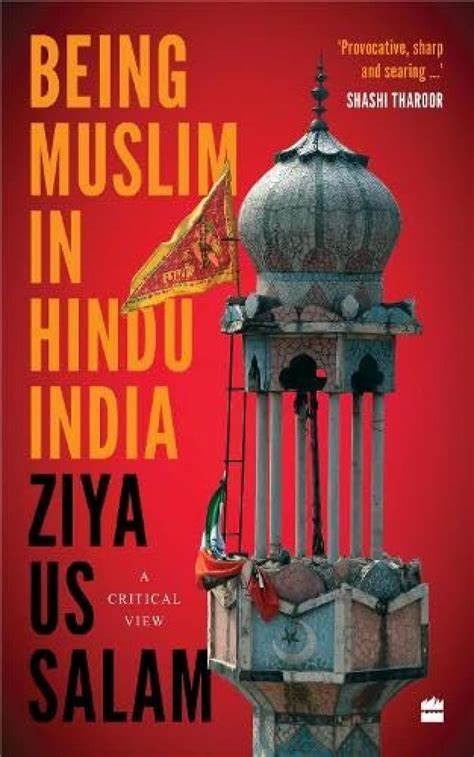Noted author-journalist ZIYA US SALAM’s latest book, Being Muslim in Hindu India has been a bestseller. In the book, Salam, who has earlier penned books like Till Talaq Do Us Part, Of Saffron Flags and Skullcaps, Lynch Files, etc., talks of what is it like to be a Muslim in India today. In an interview with MOHAMMED NAUSHAD KHAN, he opined that if people in the corridors of power are scared of using the word Muslim; imagine how difficult it must be to be a Muslim in India today. Excerpts:
Why was it important to write a book on Being Muslim in Hindu India at this juncture?
It has never been more difficult to be a Muslim, to be manifestly a Muslim and to be a practising Muslim in India than what it is now. We got independence in 1947 and since then, barring stray incidents of communal riots, Hindus and Muslims lived peacefully. There was social and communal harmony and people were not always judged on the basis of their religion, attire, and food habits.
Unfortunately, post-2014, things have changed. As our Prime Minister said in Jharkhand, in an election campaign, the tendency is to judge people by what they wear. Later as we saw in Karnataka, it was not just hollow talk.
We have seen a number of lynching instances, which all started with the allegations of cow slaughter. And then we have these calls for economic boycott of Muslims, besides frequent attacks on mosque and madrasas. So where does a Muslim go? He cannot pray in his masjid, study in his madrassa, cannot eat the food he wants, cannot wear the clothes he wants. So this story is all about being a Muslim in Hindu India.
You have written about socio-political, cultural and democratic space sinking for minorities, especially Muslims. So how would you respond to that?
I would not like to cloak my statement behind the word minority. The book is all about Muslims. There is shrinking space for Muslims in contemporary political discourse. Almost all political parties shy away from giving tickets to Muslims. The number of Muslim candidates is going down, whether it is in Uttar Pradesh or Rajasthan, Maharashtra or MP. And obviously, the BJP doesn’t give many tickets to Muslims. It’s for the first time since Independence that there is no Muslim minister at the Centre. The ruling party does not have a single MP who is a Muslim.
Do you believe hate against Muslims is at its peak right now?
It is true and periodically we see this expression of hatred, particularly by political leaders, but also at the social level, on the streets, on social media and everywhere. The idea is to make a Muslim invisible. You don’t allow him to grow a beard, you don’t allow her to don hijab, you don’t make it easy for him to go to masjid to pray, and you don’t allow him to set up a shop so that Muslims are not visible anywhere. It’s like India is in negation of its past. Even halal products are being banned. There is a denial of a strong Muslim existence and contribution in the country.
What are the challenges before Muslims?
The Muslims have become invisible in political discourse of the country and in many ways left redundant. Forget the BJP, even the Congress and the other Opposition parties like the Samajwadi Party, DMK and NCP are not ready to use the word Muslim from a public platform. When Akhilesh Yadav sought votes of everybody in UP in 2022 elections, how many times did you see his fellow Muslim MLAs with him on stage?
The reality is today that Hindutva decides the discourse of the country. And other political parties are too timid to take on Hindutva. Their only recourse is soft Hindutva. And as Congress discovered in Madhya Pradesh, soft Hindutva can never replace the real hard Hindutva. The need of the hour is to go back to the letter and spirit of our Constitution and seek votes in the name of development, inclusive development.
We have this INDIA alliance which has the word inclusive in it, but it is just a word. When it comes to practical elections, where does the word inclusive go? Political parties are not even ready to raise the issues related to Muslims anymore. How many political leaders have gone to the house of lynching victims over last four years? When Akhlaq was lynched in 2015, we saw people across different political parties, the SP, the BSP, the Congress; and CPM leaders went to his house. Something similar, but to a lesser extent happened with Pehlu Khan in 2016. But after that, no political leader wants to be seen with a lynching victim.
We had communal riots in the past but political leaders have always gone after the riots to be with the victims, to give them some monetary support, some emotional support. In this case, no political party is ready to come forward and extend emotional support to Muslims. How many times have you seen Rahul Gandhi make a statement about lynching incidents in Rajasthan where his own government was in power? It seems today you can kill a Muslim for no rhyme or reason and there will be no protest.
Does that mean that the attitude of political parties towards Muslims is because they have been made politically untouchable?
As I said in the book, Muslims are the new untouchables in modern India, at least when it comes to political discourse and that is a sad reality. For long we have lived with the presumption that government cannot be formed without Muslim support. I think the Narendra Modi government has done an excellent job of disproving that myth. It is still a sad comment on the democracy of the country when the largest minority has no representative in government at the Centre.
How dangerous it is for our democracy?
Practically we are in a Hindu Rashtra today. You see there are certain political prisoners in jail for last three years and when their cases come up for hearing before High Court or Supreme Court or any other court, summarily another date is given. And then you have people like Narsighanand, Pinky Chaudhary and others issuing genocidal calls not from some remote village, but from Jantar Mantar less than a kilometer from our home ministry, from our Parliament. When they raised slogans like Jab Mulley Kate Jayenge, Jai Sri Ram, Chillayenge, for how long were they arrested?
So, if out of a technical compulsion, a Hindu hatemonger is arrested today, the treatment meted out to him is completely different from what an alleged wrongdoer from the Muslim community faces today.
You have used the term orphan for Muslims. Have the Muslims been pushed into corner?
In our society when a child loses his father particularly if he is a youngster, the attitude of people around him changes. Nobody wants to have anything to do with the family. There is nobody around to embrace the child, call him as one of his own or her own. That’s the reality of our society and it is the reality of Muslim community in India today at a much larger level. Which political party comes forward to embrace Muslims today? If people in the corridors of power are scared of using the word Muslim, imagine how difficult it must be to be a Muslim in India today.
Your book indicates the kind of ray of hope still there for Muslims?
That ray of hope comes from within the community. At one level you see our youngsters are trying to move ahead in the field of education. I have talked of the so-called UPSC Jihad controversy the Sudarshan channel started when some Muslim boys and girls made it to civil services. But at another level, there is this hunger within the community to be at par with everybody else, not to be backward, economically or educationally. So there is that relentless endeavour by our community to move ahead based on education.
The path ahead is steep but we have taken the first step. So that is one ray of hope.
The second ray of hope is that of Shaheen Bagh struggle, that protest which turned into a movement against CAA, the way Muslim women left their homes and hearths to protest. All they wanted was equality before the law, which is granted to all the people by Art. 14 of the Constitution. Unfortunately, it is something sought to be denied by CAA where for the first-time religion was made a criterion for giving citizenship to those desirous of settling down in India.
But the way the Muslim women came out led to an entirely peaceful protest in Shaheen Bagh, giving rise to a hundred other Shaheen Baghs across India, and the way they held firm to the Constitution of India, to their rights as equal citizens of the country, and the way they held on to the Quran and offered their namaz at the protest site was a wonderful advertisement for democracy. How many such examples have we got across the world, where the minority community has stood up for the Constitution of that country? This was a rare instance for all those who feel that Muslim women are backward, exploited, and vulnerable; I think they had to shut up after this protest.





